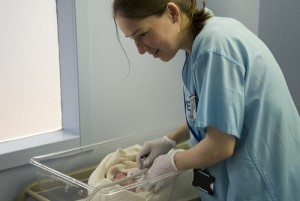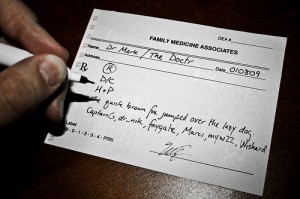 One of the funniest things I’ve noticed throughout my pregnancy is how little people know about midwives — especially young people who haven’t yet considered having children and older people who gave birth during a time when hospital births and obstetricians were pretty much the only option in the United States.
One of the funniest things I’ve noticed throughout my pregnancy is how little people know about midwives — especially young people who haven’t yet considered having children and older people who gave birth during a time when hospital births and obstetricians were pretty much the only option in the United States.
Midwives are still much less common than obstetricians in the United States — in 2003 only 8% of births were attended by midwives. That’s likely gone up in the past 7 years as natural birth has become increasingly popular, but the majority of births are still attended by obstetricians. This leads to a lot of misconceptions about midwives.
I don’t know if it’s because the word sounds New Agey or what, but when I tell people I’m seeing a midwife, they often make the following assumptions:
- I am planning a homebirth.
- I am somehow opposed to modern medicine.
- I’m taking a great risk with my health and the health of a baby by refusing the care of a doctor.
- I’m a crazy hippie lady who wants to give birth in a hut in the woods.
None of the above assumptions is true.
I’m sure most of you reading this are quite familiar with midwives and what they do, because I have smart readers. But I just want to clarify for my own sanity.
Midwives are modern care providers. They are highly educated nurse practitioners who happen to specialize in child birth and female reproductive health. Instead of medical school, they attend a graduate program in midwifery — a form of medical school condensed to include specialized education in caring for pregnant women and female reproductive health. Because they’re not learning a variety of specialties, their education is shorter, but still comprehensive.
Midwives typically have a different style than obstetricians. Because they are nurses and birth attendants, they often stay with patients throughout the labor rather than showing up to catch the baby at the end. (I’m sure there are obstetricians that also do this, but it’s less common.)
Midwives are also more likely to encourage natural birth practices such as unmedicated birth, but that doesn’t mean they’re not qualified or capable of administering pain medication during birth if you choose to have it. Choosing a midwife does not limit you to a natural birth, but if you want a natural birth, choosing a midwife can make it easier for you to achieve it.
Choosing a midwife also doesn’t mean you’ll be giving birth outside of the hospital. Most midwives have hospital privileges.
Midwives also deliver at freestanding birth centers and some do home births. Freestanding birth centers are sterile, modern medical facilities that are often dressed up to provide a more homey atmosphere than a hospital. They are not huts in the woods. Women who choose freestanding birth centers always have an emergency back-up plan in place to transfer them to a hospital in a hurry in the event of complications. However, complications are rare, because midwives generally only care for women with low-risk pregnancies.
Midwives cannot perform surgery, so if an emergency c-section is required, a surgeon will need to perform it. The good news is, all midwives are affiliated with obstetricians, which means there is likely a doctor on call within their practice who can take over if you become high risk or a c-section becomes necessary. Because they’re unable to perform the surgery themselves, midwives are less likely to push for unnecessary c-sections.
I don’t think home birth is for me, but I would have liked to use the birth center affiliated with my midwives’ practice. Unfortunately, it wasn’t covered by my insurance, so I’ll be giving birth in the hospital.
So you see, midwives aren’t just for crazy hippie ladies who want to birth in a hut. It’s just another option for prenatal care and delivery.
If you’re considering getting pregnant in the near future, and you’re not familiar with midwifery, definitely look into it as an option for you! I have been so happy with the care I’ve received from my midwives. It’s possible that you’ll decide to stick with an obstetrician for your prenatal care, but you should be aware of all of your options in case it turns out that a midwife would better suit your needs.
If you suffered complications during your birth and you’re facing a medical negligence claim, be sure to contact a lawyer as soon as possible.
